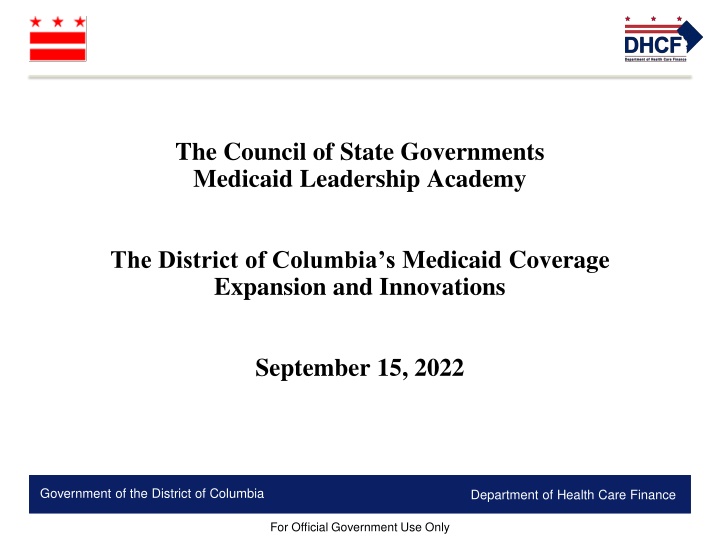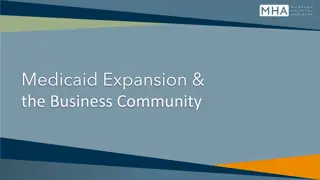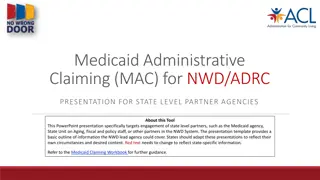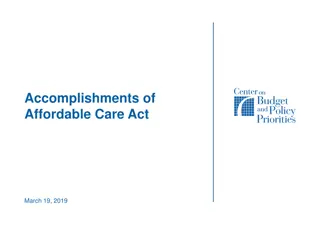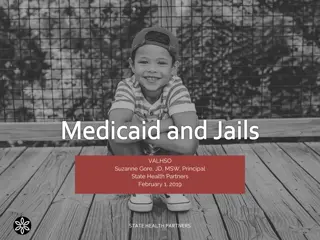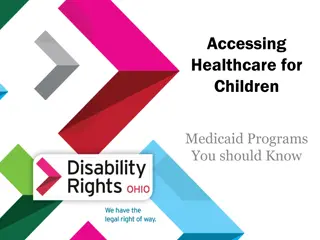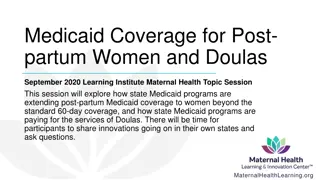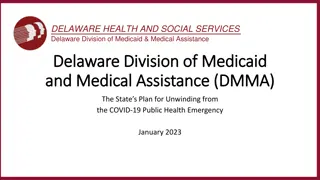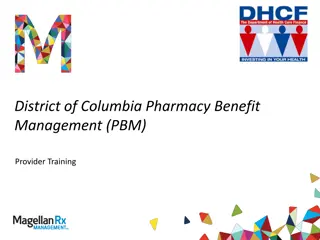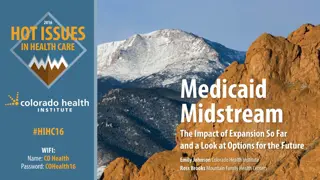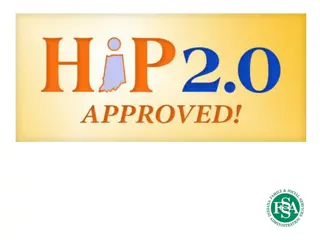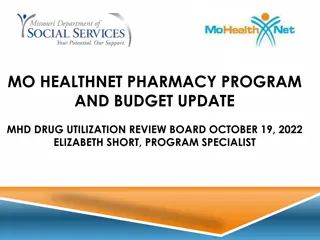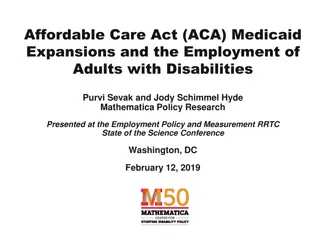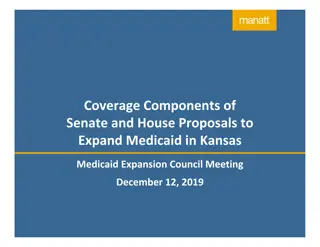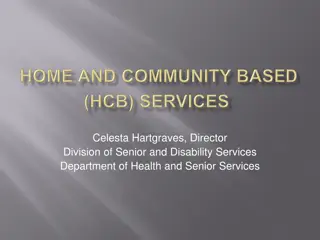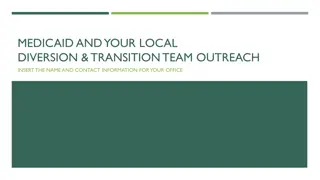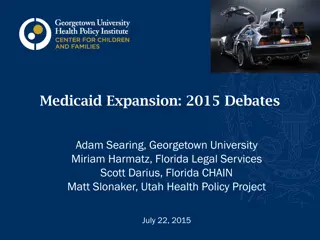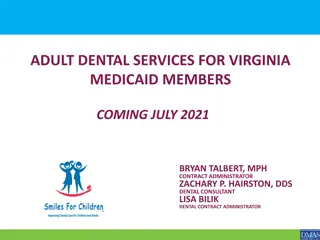Medicaid Coverage Expansion Initiatives in the District of Columbia
The Department of Health Care Finance in the District of Columbia plays a crucial role in administering various public health insurance programs, including Medicaid. With a vision to provide necessary support to all residents for active engagement in their health, the department focuses on improving health outcomes through accessible and quality healthcare services. More than 40% of District residents are covered by programs like Medicaid, CHIP, Alliance, and Immigrant Children’s Coverage. The eligibility for Medicaid in DC varies based on income levels, with efforts underway to reform and expand coverage opportunities.
Download Presentation

Please find below an Image/Link to download the presentation.
The content on the website is provided AS IS for your information and personal use only. It may not be sold, licensed, or shared on other websites without obtaining consent from the author.If you encounter any issues during the download, it is possible that the publisher has removed the file from their server.
You are allowed to download the files provided on this website for personal or commercial use, subject to the condition that they are used lawfully. All files are the property of their respective owners.
The content on the website is provided AS IS for your information and personal use only. It may not be sold, licensed, or shared on other websites without obtaining consent from the author.
E N D
Presentation Transcript
The Council of State Governments Medicaid Leadership Academy The District of Columbia s Medicaid Coverage Expansion and Innovations September 15, 2022 Government of the District of Columbia Government of the District of Columbia Department of Health Care Finance Department of Health Care Finance For Official Government Use Only
The Department of Health Care Finance (DHCF) is a Cabinet Level Agency Responsible for the Administration of Medicaid and Other Public Health Insurance Programs in DC VISION All residents in the District of Columbia have the supports and services they need to be actively engaged in their health and to thrive. MISSION The Department of Health Care Finance works to improve health outcomes by providing access to comprehensive, cost-effective and quality healthcare services for residents of the District of Columbia. VALUES Accountability Compassion Empathy Professionalism Teamwork Government of the District of Columbia Government of the District of Columbia Department of Health Care Finance Department of Health Care Finance For Official Government Use Only
The Districts Public Health Insurance Programs Medicaid, CHIP, Alliance and Immigrant Children s Cover More Than 40% of All District Residents *Source: U.S. Census Bureau, 2019 American Community Survey 1-year estimates; DHCF Medicaid Management Information System (MMIS) data extracted in November 2021; Haley et al., Progress in Children s Coverage Continued to Stall Out in 2018, Urban Institute, October 2020. Government of the District of Columbia Government of the District of Columbia Department of Health Care Finance Department of Health Care Finance For Official Government Use Only
Most Low-Income Non-Elderly Adults are Medicaid-Eligible; Low-Income is 200% FPL Which is About $25k/Person or About $52k/Family of Four CHILDLESS ADULTS 210% PARENT/ CARETAKER RELATIVES 216% CHILDREN/PREGNANT WOMEN 324% QUALIFIED MEDICARE BENFICIARIES 300% AGED, BLIND, DISABLED 100% MEDICALLY NEEDY* 50% 0% 50% 100% 150% 200% 250% 300% 350% DC Medicaid Eligibility Income Levels by Federal Poverty Level (FPL) Government of the District of Columbia Government of the District of Columbia Department of Health Care Finance Department of Health Care Finance For Official Government Use Only
Building on Delivery System Changes and Infrastructure Improvements, DHCF Announced Medicaid Reform Efforts in 2019 Coverage: Leveraged ACA opportunities to expand coverage to low-income adults Value: Increasing value-based payment approaches through pay for performance models in: Managed care program FQHC Alternative Payment Methodology Other provider reimbursement / payment methods Enhanced Care Coordination: Promoting access to the right care at the right time through health homes program Knowledge Building/Performance: Created data warehouse to expand quality measurement and data analysis through the Medicaid Data Warehouse IT: Developed technology infrastructure to allow for secure exchange of information across providers through HIE, EHR Strategic Priorities to Guide Reform Efforts Building a health system that provides whole person care Ensuring value and accountability Strengthening internal operational infrastructure Unwinding from the public heath emergency (PHE) 1. 2. 3. 4. Government of the District of Columbia Government of the District of Columbia Department of Health Care Finance Department of Health Care Finance For Official Government Use Only
Moving to Whole Person Care Requires Better Integration of Services and Support to Providers Integration of Services Behavioral Health Medicaid and Medicare Supporting Providers Enable information sharing through Health Information Exchange (HIE) Make consent and social services information more accessible via HIE Provide on the ground technical assistance Government of the District of Columbia Government of the District of Columbia Department of Health Care Finance Department of Health Care Finance For Official Government Use Only
Part of Whole Person Care is Better Integrating Behavioral and Physical Health Services Achieving This Requires Transformation of the District s Behavioral Health Services and System Key gaps in the Medicaid behavioral health service array Disparate access to IMD services between Medicaid managed care and Fee for Service (FFS) programs Complex and overlapping oversight make it harder to manage services in a holistic way that is integrated with other medical treatment In DC, oversight of Medicaid behavioral health services is divided, with overlapping authority, primarily among Medicaid, Medicaid MCOs, and the behavioral health authority (Department of Behavioral Health or DBH) The most intensive behavioral health services - mental health rehabilitative services (MHRS) and substance use disorder (SUD) - are carved out of managed care program and provided through FFS by the network of DBH-certified providers Government of the District of Columbia Government of the District of Columbia Department of Health Care Finance Department of Health Care Finance For Official Government Use Only
Part of Whole Person Care is Better Integrating Behavioral and Physical Health Services Achieving This Requires Transformation of the District s Behavioral Health Services and System Phase 1 Phase 2 Phase 3 FY24 and Beyond January 2020 October 2023 Incorporate a full continuum of behavioral health services into Medicaid managed care plans Focus on additional opportunities to integrate physical and behavioral health for Medicaid beneficiaries. Implementation of the District s Medicaid 1115 Behavioral Health Transformation Waiver Five key areas of focus: Services, MCO Contractual Considerations, Provider and Beneficiary Support and Communications, Performance Management, and Provider Rates. In FY21, work on the Waiver continues as the District is transitioning 8 of the 10 Waiver services to permanent State Plan authority, beginning January 1, 2022. Government of the District of Columbia Government of the District of Columbia Department of Health Care Finance Department of Health Care Finance For Official Government Use Only
For dually eligible beneficiaries, the coordination of Medicaid and Medicare services is vital to whole-person Approximately 39,000 of DHCF s enrolled participants are dually eligible for both the Medicare program and Medicaid: About two-thirds are full duals enrolled in both Medicare and full Medicaid coverage About a third are QMB only enrolled in Medicare with some financial assistance paying Medicare cost-sharing from the Medicaid program Both can benefit from improved coordination across Medicare and Medicaid The District launched District Dual Choice in February with the goal to increase Medicare-Medicaid coordination District Dual Choice is a highly integrated dual eligible special needs plan (HIDE SNP), that: Offers enhanced care management for many who otherwise lack care management Improves integration of benefits and reduce duplication of services between payers Simplifies and streamlines navigation of services for beneficiaries and their families and caregivers Government of the District of Columbia Government of the District of Columbia Department of Health Care Finance Department of Health Care Finance For Official Government Use Only
Health Information Exchange (HIE) Helps Providers Make the Connections Needed to Integrate and Coordinate Care More Seamlessly DC HIE Connectivity: DC and beyond the borders of the District Today Major Providers and Health Systems are Connected 8 Hospitals (all) 36 Long Term Care Facilities, including 15 Nursing Facilities; 20 Home Health Providers 8 Federally Qualified Health Centers (all) 30 Behavioral Health Providers 8 Community Based Organizations DC HIE Use at a Glance (as of March 2022) 13,000+ approved users of the DC HIE Patient Care Snapshot (Monthly Query) 1,156 users Encounter Notification Services access 619 locations Sharing Admit, discharge, transfer ~300 locations Sharing Clinical care documentation 200+ locations Government of the District of Columbia Government of the District of Columbia Department of Health Care Finance Department of Health Care Finance For Official Government Use Only
DC is Investing American Rescue Plan Funds to Increase Provider Participation in HIE for Behavioral Health and Other Home and Community Services (HCBS) Providers Achieving whole person, integrated care requires all Medicaid providers participate in HIE HCBS Promoting Interoperability (PI) Program Technical Assistance supports providers in connecting with the District s HIE The HCBS PI Program focuses on HCBS providers: inclusive of behavioral health, long-term care, disability services, and housing support services providers) Providers are rewarded for meeting milestones to adopt and implement Certified EHR Technology (CEHRT) and/or approved case management systems and connect to the DC Health Information Exchange (DC HIE). Program is modeled off the federal HITECH programs Government of the District of Columbia Government of the District of Columbia Department of Health Care Finance Department of Health Care Finance For Official Government Use Only 11
The DC HIE Has Six Core Capabilities for Providers to Assist in Sharing Actionable Data to Inform the Patient s Entire Care Team Government of the District of Columbia Government of the District of Columbia Department of Health Care Finance Department of Health Care Finance For Official Government Use Only
DHCF and DC HIE DHCF Partnered to Make Sharing Behavioral Health Information Including Substance Use Disorder Data Possible for Providers SUD Consent Form Government of the District of Columbia Government of the District of Columbia Department of Health Care Finance Department of Health Care Finance For Official Government Use Only
Whole Person Care is More Than Just Health Care and the Community Resource Information Exchange (CoRIE) Initiative Connects Health Care Providers with Social Services DHCF, CRISP DC, DC Primary Care Association, and DC Hospital Association are collectively known as CoRIE Partners CoRIE is a Partnership Committed to supporting and sustaining technical solutions and enabling coordinated whole person care across health, human, and social service providers in the District. Screening for social risks and share dispositions Lookup resources through a centralized community inventory (CRI) Refer to appropriate community and support services Together these 3 functionalities enable data sharing among health system stakeholders to address individuals social needs. CoRIE is a set of 3 technical functionalities to address SDOH Enables screening and referral information to be shared and displayed regardless of how it was collected Ensures care partners can view the same information via DC HIE regardless of the vendor platform they use CoRIE is a Vendor Agnostic Approach Digitally connects care partner, including health and social service providers, through the DC HIE health data utility Provides shared services across the region Fosters a culture of shared responsibility for ensuring the availability and quality of actionable information CoRIE is an Interoperable System within the DC HIE 14 Government of the District of Columbia Government of the District of Columbia Department of Health Care Finance Department of Health Care Finance For Official Government Use Only
Provider Technical Assistance is Necessary: Integrated Care DC is our One Stop Shop for Practice Transformation Support Prepare providers for the behavioral health carve-in planned for FY23, as well as transition to value-based payment programs. Competency-based practice transformation efforts directly align with DHCF s strategic priorities to deliver whole person care, and address provider needs in several domains: Clinical Operational Financial Integrated Care Technical Assistance program Community-wide learning opportunities (www.integratedcaredc.com) Individualized practice coaching Government of the District of Columbia Department of Health Care Finance For Official Government Use Only
Whole Person Care Can Be Achieved With Better Service Integration and Key Investments In and Support of Providers Make coverage and benefits accessible Build the infrastructure needed to share valuable data for providers / care teams Offer technical assistance to the entire provider community to transform care and utilize new tools Collaborate with other agency partners and stakeholders will be key Government of the District of Columbia Government of the District of Columbia Keep at it! Department of Health Care Finance Department of Health Care Finance For Official Government Use Only
Melisa Byrd | melisa.byrd@dc.gov Learn more about DC Medicaid at: https://dhcf.dc.gov/ @DCHealthCareFin dchealthcarefinance DC-Department-of-Health-Care-Finance-DHCF Government of the District of Columbia Government of the District of Columbia Department of Health Care Finance Department of Health Care Finance For Official Government Use Only
